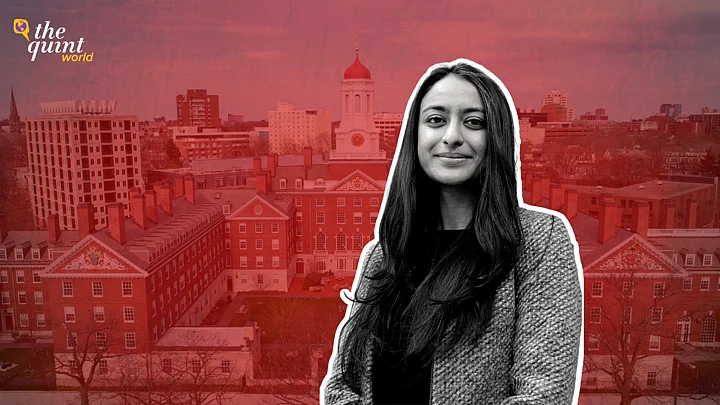Apsara Iyer, a second year Indian-American student at Harvard Law School, was elected president of the prestigious Harvard Law Review and became the first woman from the community to be elected to the position in the publication’s 136-year-history.
Iyer became the 137th president of the Harvard Law Review, one of Harvard’s oldest student-run legal scholarship publications, founded in 1887.
She succeeds Priscila Coronado, the first Latina to be elected the President of the publication and since 2018, has been investigating art crime and repatriation.
"Since joining the Law Review, I have been inspired by her (Priscila's) skillful management, compassion, and capacity to build vibrant, inclusive communities. I am so grateful that we 'Volume 137' inherit her legacy, and I am honored to continue building on this important work over the next year," Iyer said in a statement following the announcement of her appointment.
In a press release, Coronado said that the publication was “extremely lucky” to have Iyer at the helm.
The 29-year-old’s predecessors in the role include former President of the United States Barack Obama and former Supreme Court Justice Ruth Bader Ginsberg and Justice Kentaji Brown Jackson.
An Early Love for Archeology
Born in Chicago and raised in Indiana, Apsara Iyer said that she traces her interest in archeology and the ancient people of Latin America back to her childhood, when she enjoyed reading books about the Incas, the largest empire in pre-Columbian America.
Iyer graduated from Yale with a B.A. in Economics and Math, and Spanish. Subsequently, she moved to pursue an MPhil at Oxford, owed to “her dedication to archaeology and indigenous communities,” as a Clarendon Scholar.
By 2018, she had joined the Manhattan District Attorney’s Antiquities Trafficking Unit where she investigated art crime.
At the Manhattan DA’s office, she analysed and processed evidence for grand jury investigations into stolen cultural property and moreover, coordinated with federal and international law-enforcement authorities for the repatriation of over 1100 stolen pieces of art to 15 countries.
In college, Iyer had undertaken research and fieldwork in India and Peru around the concept that when objects hold immense sacred and sentimental value, the people will not assign a monetary value to them, exploring if the antiquities found at heritage sites fit into the class of object.
The fall of 2020 saw Iyer enrolled at Harvard Law School and during her summer internship, she worked to co-author a chapter in a new casebook on cultural heritage and law as a Chayes International Public Service Fellow with Maastricht-based research initiative, TRANSFORM.
At Harvard, she is a student at the International Human Rights Clinic and a member of the South Asian Law Students Association.
Iyer’s commitment to fight illicit antiquities trafficking pushed her to take a leave of absence from Harvard Law School in 2021-22 and return to the DA’s Office, where she worked on investigations of international antiquities trafficking and rose to become the deputy of the Antiquities Trafficking Unit.
Out of all the cases she worked on, a notable one includes that of hedge fund billionaire Micheal Steinhardt in 2021, who agreed to surrender $70 million in antiquities which were determined to be stolen. Moreover, Steinhardt accepted a first-of-its-kind lifetime ban on the acquisition of antiquities as part of a non-prosecution agreement.
She has also been previously involved with the Harvard Human Rights Journal and the National Security Journal.
'A Non-Traditional Student'
The Indian-American said that as president of the Law Review, her aim would involve including more editors in the article selection and review process, and uploading the prestigious publication's reputation of “high-quality” work.
“What’s been so meaningful to me is that the Law Review has been an amazing community of incredibly talented, passionate people…And I feel like I’ve been able to be welcomed into this organization that’s filled with individuals who are so intelligent and so interested in different parts of the law.”Apsara Iyer tells The Crimson
She said that she is a “non-traditional student” and is unsure of her plans after graduating from Harvard Law School.
The Law Review, founded in 1887 by future Supreme Court Justice Louis D. Brandeis, is an entirely student-edited journal with the largest circulation of any law journal in the world.
